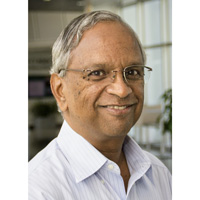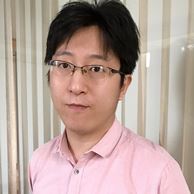Keynote Speech 1 / November 13
 Prof. Rangachar Kasturi
Prof. Rangachar Kasturi
University of South Florida
Location: Terrsa Hall (West building)
Chair: Venugopal Govindaraju (University at Buffalo, USA)
Title: Graphics Recognition: A Historical Perspective and Recent Advances

![]()
Abstract: Graphics predates text as a means of human communication. However, Graphics Recognition as an identified scientific discipline is much more recent [1]. In this talk, I trace the history and contributions of graphics recognition as a part of the larger pattern recognition research over the past forty years. I conclude with a few remarks on its state of the art and open challenges.
Bio: Dr. Kasturi is a professor of Computer Science and Engineering at the University of South Florida. He was born in Bangalore (1949) and received his BE degree from Bangalore University (1968) and MSEE (1980) and Ph.D. (1982) degrees from Texas Tech University. He was a Professor at the Pennsylvania State University (1982-2003). He was the Editor-in-Chief of the Machine Vision and Applications (1993-94) and the IEEE Transactions on Pattern Analysis and Machine Intelligence (1995-98). He was the President of the IAPR (2002-04) and the IEEE Computer Society (2008). He is a Fellow of IEEE and IAPR. As a current Fulbright Specialist, he is available to share his expertise with educators and researchers worldwide.
Keynote Speech 2 / November 14
 Prof. Andreas Dengel
Prof. Andreas Dengel
German Research Center for
Artificial Intelligence (DFKI)
Location: Terrsa Hall (West building)
Chair: Koichi Kise (Osaka Prefecture University, Japan)
Title: Who are we now? An attempt to understand the ICDAR community!
![]()
Abstract: In an atmosphere motivated by the colloquial `publish or perish’ mindset, for every scientific community, the significance of its mission is a must-see. With more and more publications, it becomes important to develop `productivity’ indicators demonstrating sustainable impact to survive. While in traditional approaches, it was sufficient to collect quantitative data on scientific publications, i.e. number of citations, nowadays there is an increasing demand for multidimensional and qualitative methods to evaluate a scientific work, e.g. citation polarity, authority of an author.
Document Analysis and Recognition has a long tradition culminating in the foundation of the ICDAR conference series. This series started in 1991 leading to 14 biannual conferences. As one important outcome there is access to an entire corpus of proceedings capturing a rich source to learn about document analysis methods, datasets, models, and architectures. Moreover, the papers in the ICDAR corpus deal with various research fields, applications, and approaches. They contain text, diagrams, tables, formulas, and pictures. They are originated by authors from many different organizations who refer to each others work published in ICDAR proceedings or somewhere else. In summary the corpus records the historical change of contributors, topics, and technology. It captures hidden patterns revealing the various evolutionary aspects of a community, its scientific trends and opinion leaders, its citation behavior as well as collaborating cliques. In my talks I like to address several aspects of mining this document corpus by syntactic, semantic, and pragmatic approaches aiming at a quantitative and qualitative analysis of our community, its individual members.
Bio: Professor Andreas Dengel is a member of the Management Board as well as Scientific Director at the German Research Center for Artificial Intelligence (DFKI) in Kaiserslautern where he is leading the Smart Data & Knowledge Services Research Department. In 1993 he became a Professor at the Computer Science Department of the University of Kaiserslautern. Since 2009 he also holds an Honorary Professorship at the Dept. of Computer Science and Intelligent Systems, Graduate School of Engineering of the Osaka Prefecture University.
From 1980 to 1986 Andreas studied Computer Science and Economics at the University of Kaiserslautern. He subsequently worked at the Siemens research lab in Munich and at the University of Stuttgart where he completed his doctoral thesis in 1989. In 1991 he worked as a guest researcher at Xerox Parc in Palo Alto. Andreas is a member of many international advisory boards but also was a member of the ICDAR advisory board from its foundation in 2001 until 2015. Furthermore, he is the co-founder of the DAS workshop series and hosted the first DAS in Kaiserslautern. Andreas was/is program/technical chair of international conferences, such as ICPR, ICDAR, ICFHR, DAS, KES, KI, ICMU and KM. Moreover, he is founder or initiator of several successful start-up companies. In 2005 he received a “Pioneer Spirit Award” for one of his start-up concepts and at Cebit 2015 his recent start-up digipen technologies has received the Cebit Innovation Award. He is co-editor of various international computer science journals, i.e. IJDAR, and of book series on Machine Perception and Artificial Intelligence (World Scientific), has written or edited 12 books and is author of more than 350 peer-reviewed scientific publications, several of which received a Best-Paper Award. He supervised more than 200 PhD, master and bachelor theses.
In Cambridge, UK, in 2004, Andreas Dengel has been elected a Fellow of the International Association for Pattern Recognition (IAPR). His scientific contributions have been honored several times by international scientific prizes. His main scientific emphasis is in the areas of Document Analysis and Recognition, Smart Data, Deep Learning, Semantic Technologies, Information Retrieval, Multimedia Mining, and Social Media.
Keynote Speech 3 / November 15
 Prof. Xiang Bai
Prof. Xiang Bai
Huazhong University of
Science and Technology
Location: Terrsa Hall (West building)
Chair: Shinichiro Omachi (Tohoku University, Japan)
Title: Deep Neural Networks for Scene Text Reading Revisited

![]()
Abstract: Recently, the community of document analysis has seen a strong revival of neural networks, which is mainly stimulated by the great success of deep neural network models. Most scene text reading systems based on deep learning concern the problem of word spotting in natural scene images that is specific to horizontal text in Latin scripts, while text can be arbitrarily oriented and multilingual in the wild. In this talk, I will provide a thorough overview of the state-of-the-art deep learning methods for text detection and text recognition in natural scene images, and evaluate their performance in accuracy and efficiency. In addition, I will explore how deep learning methods can be effectively applied to the detection and recognition of both Latin and Non-Latin text with arbitary orientations. Last, several successful applications of scene text reading are given as well as the prediction of potential research directions.
Bio: Xiang Bai is currently a Full Professor with the school of Electronic Information and Communications, Huazhong Univerisity of Science and Technology (HUST), Wuhan, China. He received the BS, MS, PhD degree from HUST in 2003, 2005, 2009, respectively. He was a joint PhD student at UCLA, co-supervised by Zhuowen Tu and Alan Yuille. In recent years, he has focused on scene text reading, and developed a series of state-of-the-art methods on text detection, text recognition, script identification in natural images. He is a major contributor of MSRA-TD 500 dataset for multi-oriented text detection. He serves as an associate editor for Pattern Recognition, Pattern Recognition Letters, Neurocomputing, and Frontier of Computer Science.